译林英语必修3 Unit 3 Back to the past Project课件(共39张PPT)
文档属性
| 名称 | 译林英语必修3 Unit 3 Back to the past Project课件(共39张PPT) |  | |
| 格式 | zip | ||
| 文件大小 | 1.0MB | ||
| 资源类型 | 教案 | ||
| 版本资源 | 牛津译林版 | ||
| 科目 | 英语 | ||
| 更新时间 | 2020-03-30 15:32:01 | ||
图片预览

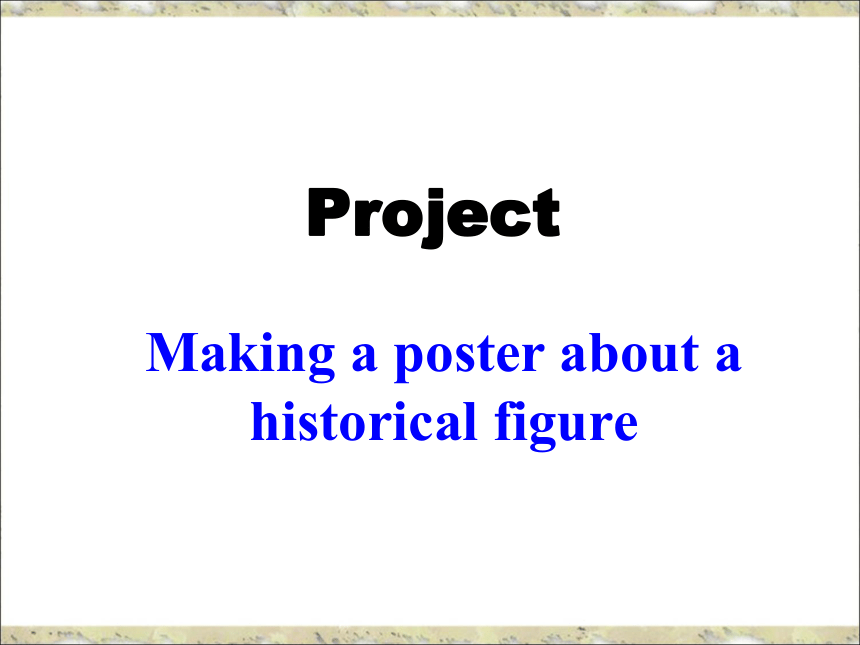
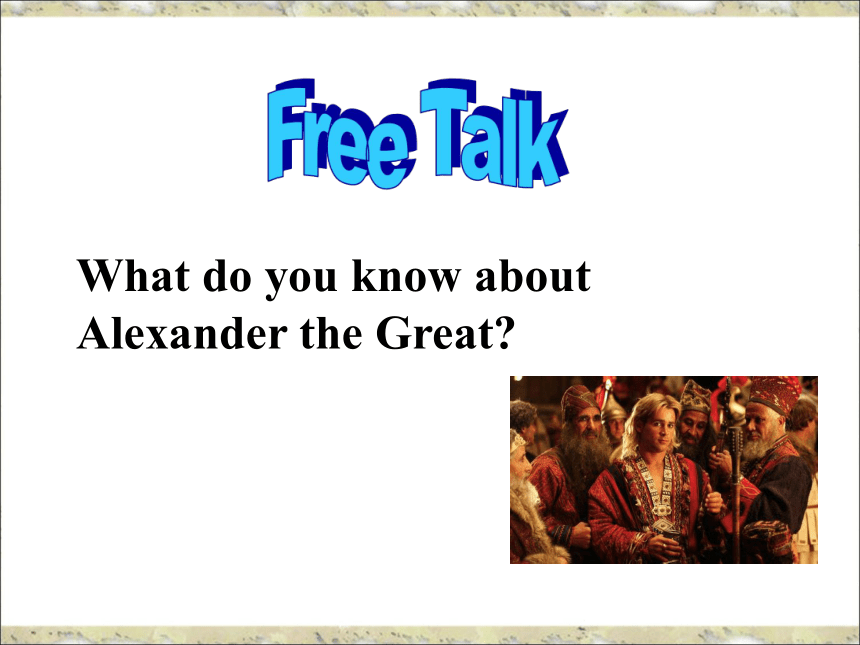
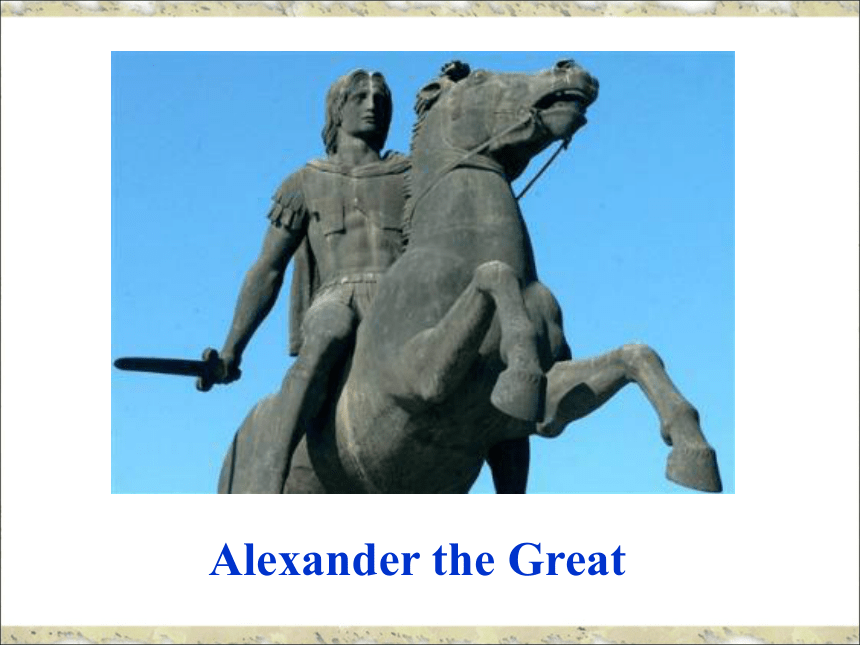
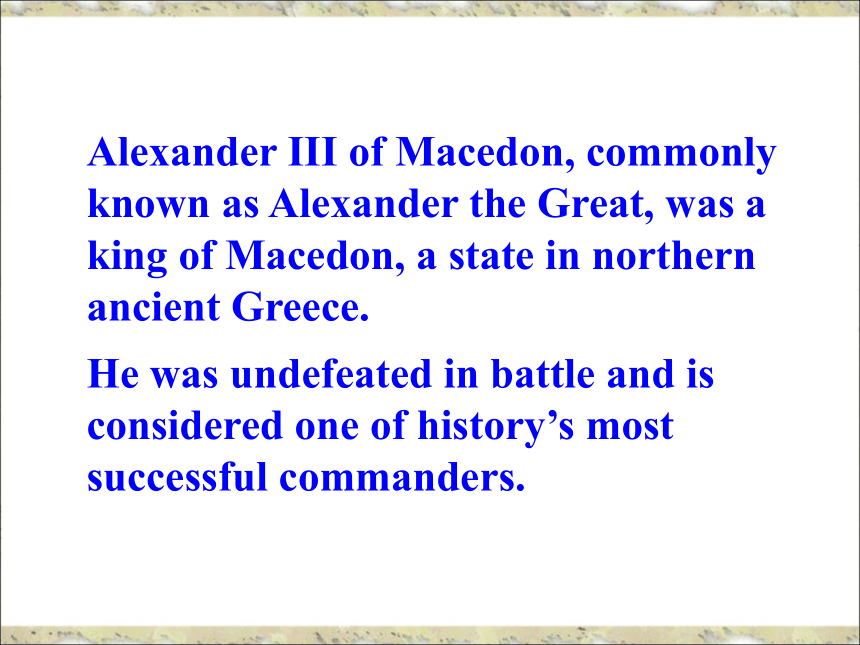
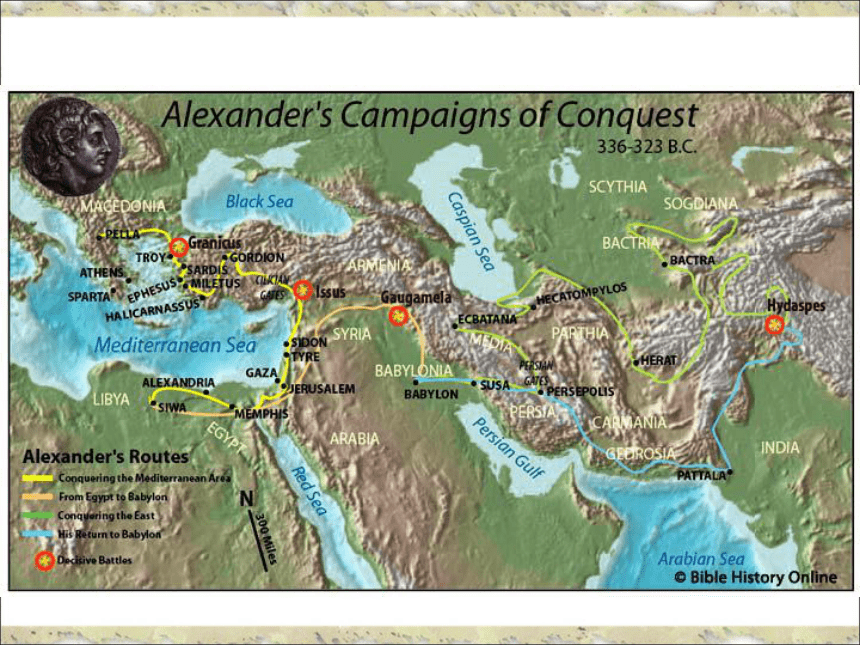
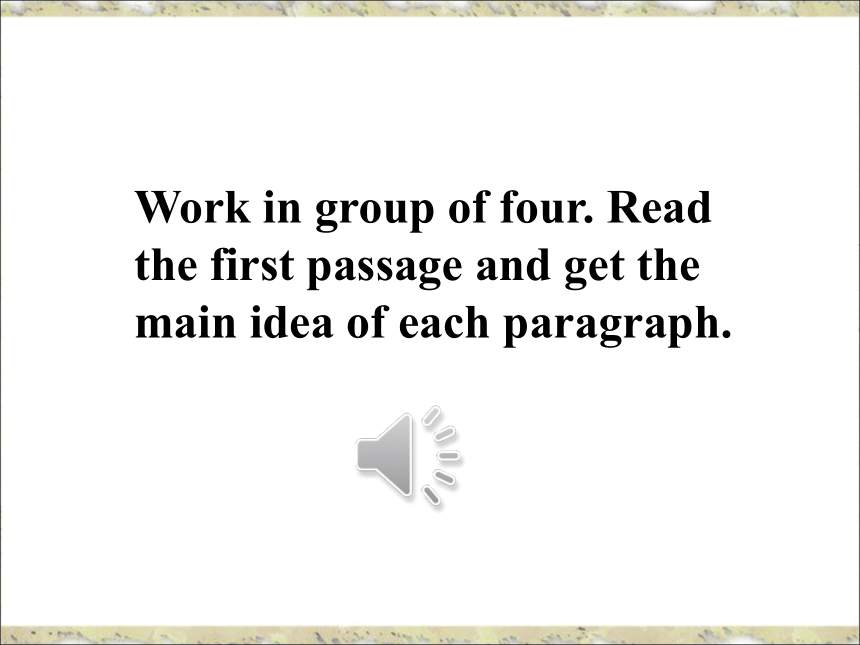
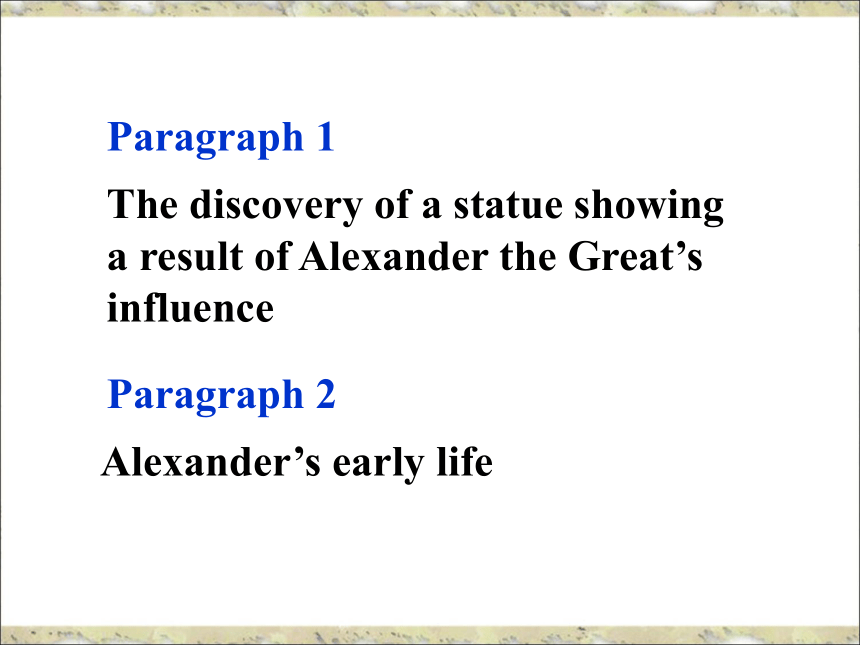
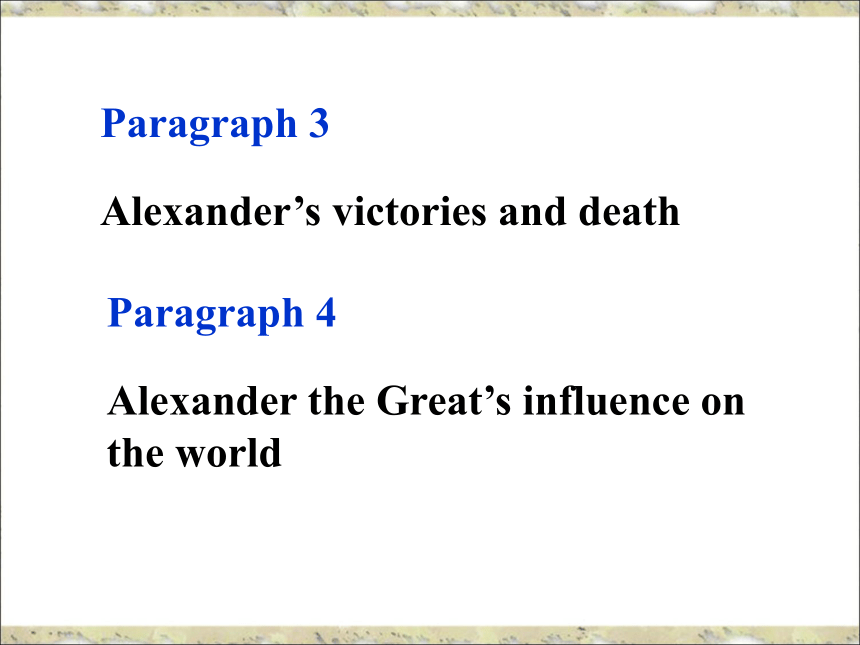
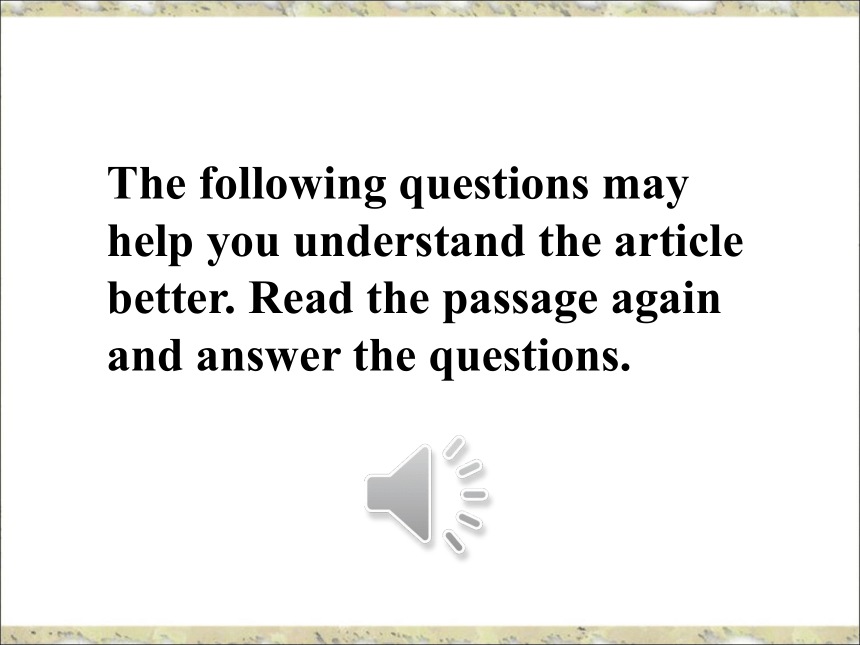
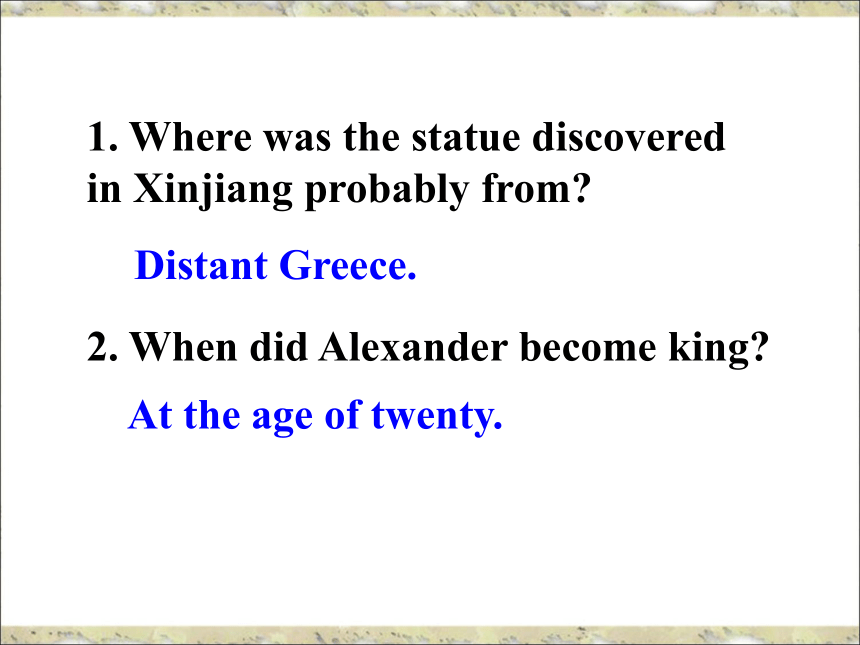
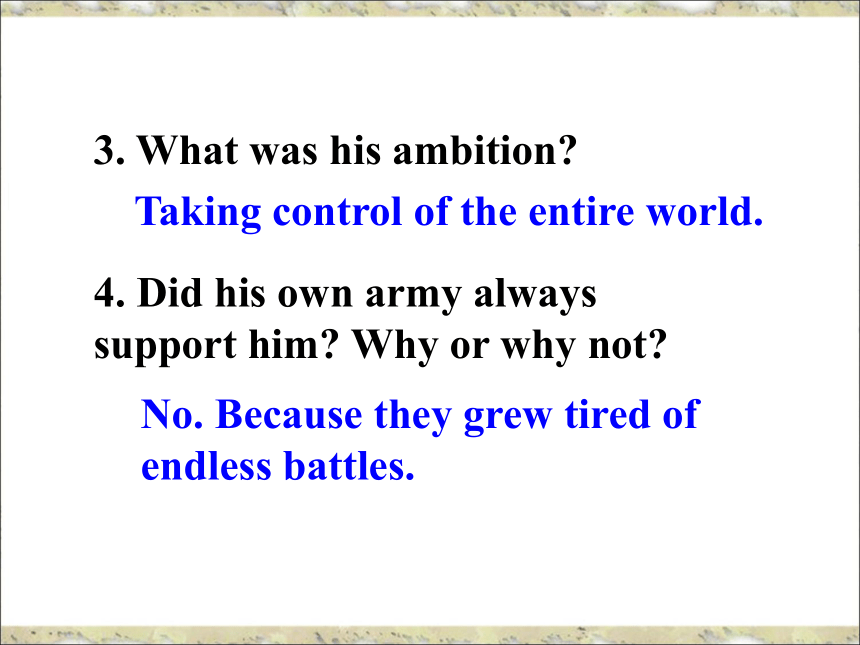
文档简介
(共39张PPT)
Making a poster about a historical figure
Project
What do you know about Alexander the Great?
Alexander the Great
Alexander III of Macedon, commonly known as Alexander the Great, was a king of Macedon, a state in northern ancient Greece.
He was undefeated in battle and is considered one of history’s most successful commanders.
Work in group of four. Read the first passage and get the main idea of each paragraph.
The discovery of a statue showing a result of Alexander the Great’s influence
Alexander’s early life
Paragraph 1
Paragraph 2
Alexander the Great’s influence on the world
Paragraph 3
Alexander’s victories and death
Paragraph 4
The following questions may help you understand the article better. Read the passage again and answer the questions.
1. Where was the statue discovered in Xinjiang probably from?
Distant Greece.
2. When did Alexander become king?
At the age of twenty.
3. What was his ambition?
Taking control of the entire world.
4. Did his own army always support him? Why or why not?
No. Because they grew tired of endless battles.
5. How old was he when his kingdom become the largest in the world?
He was thirty years old.
6. What happened to his kingdom after he died?
His generals divided his kingdom among themselves.
Quotations about Alexander the Great
I am not afraid of an army of lions led by a sheep; I am afraid of an army of sheep led by a lion.
There is nothing impossible to him who will try.
I am indebted to my father for living, but to my teacher for living well.
What is philosophy?
Philosophy is the study of general and fundamental problems, such as those connected with reality, reason, existence, knowledge, values, mind, and language.
Can you name any famous philosophers?
Confucius
Plato
Hegel
Karl Marx
Socrates
(苏格拉底)
a classical Greek Athenian philosopher
Now read the second passage and get the main idea of each paragraph.
The meaning of philosophy
Brief introduction to Socrates
Paragraph 1
Paragraph 2
Reasons for Socrates’ death
Paragraph 3
Socratic Method — basis of modern philosophy and science
Paragraph 4
Then read the passage carefully and answer the questions.
What does the word ‘philosophy’ mean?
2. Who was Socrates?
3. What was his special way of teaching?
It means ‘love of wisdom’.
The father of Western philosophy.
He taught by asking questions.
4. What is the basis of modern philosophy and science?
5. What do people think of him?
The idea of asking questions until you reach the right answer.
He is considered as the hero of all people who search for the truth.
If a man is proud of his wealth, he should not be praised until it is known how he employs it.
Do not do to others what angers you if done to you by others.
The only good is knowledge and the only evil is ignorance.
The unexamined life is not worth living.
Quotations about Socrates
When asked how a statue from distant Greece could have appeared in China, researchers explained that no doubt …
本句是主从复合句,其中when asked how…是一个省略的时间状语从句,其完整形式为when they were asked how…,这里how引导宾语从句。
While (I was) at college, I began to know him, a strange but able student.
Before leaving, turn off all the lights.
no doubt 很可能;无疑地
There is no doubt at all that we did the right thing.
There is no doubt that we will be successful.
There is no doubt about his innocence.
in doubt 怀疑;拿不定主意
We are in doubt (about) what to do next.
no / without / beyond doubt 无疑地;必定;当然
The truth of his guilt is beyond doubt.
由doubt组成的一些短语
make no doubt of 对……毫不怀疑
She made no doubt of what he had said.
throw / cast doubt on 使人对……产生怀疑
What he had done cast doubt on his honesty.
However, many cities rose up against Alexander, so he led an army to take them back.
rise up against 起来反抗
He called on the people to rise up against the invaders.
take back 收回,击退,使想起
I’ll take back all my words.
That song takes me back to the childhood.
In 334 BC, he took his army, now with 42,000 men, into the Middle East and then Egypt, defeating every army that stood in his path.
stand in one’s path 妨碍,阻拦
He is quite optimistic and insists on carrying out the plan, so you’d better not stand in his path.
get in one’s way
put sand in the wheels
be in the way
近义短语
Then he turned his eyes east, and marched all the way to India, finding victory wherever he went.
本句是主从复合句。分词短语finding victory wherever he went表示伴随状态,其中wherever he went 是地点状语从句。
march v. 前进
We continued to march after the shower.
The troops are marching into the city.
Philosophy can be thought of as a way of looking at the world around us, or of answering the great questions of life, …
think of … as … 认为……是……,把……看作是……
I have always thought of Peter as a great scholar.
Yet, Socrates has had a deep influence on Western thought and science.
have a deep influence 有深远影响
Climate has a strong influence on agricultural production.
influence n. 影响力;影响;有影响的人(或事物)
He is a man of some influence in the government circles.
Mr. Smith is a man of influence in this town.
influence v. 影响,对……起作用
What you read influences your thinking.
His interest in literature was greatly influenced by his grandfather.
Don’t let me influence your decision.
Through this, he challenged his students to develop and explain their own arguments.
challenge v. / n. 挑战
His ideas were challenged by the authorities.
Destruction of the environment is one of the most serious challenges we face.
Finally, some people had had enough of him, so they took him to court for questioning the existence of the Greek gods and …
have enough of 受够了……,对……感到厌烦
I have had enough of your stupid ideas.
take sb. to court for (doing) sth. 因某事而将某人告上法庭
He was taken to court for a murder.
Making a poster about a historical figure
Project
What do you know about Alexander the Great?
Alexander the Great
Alexander III of Macedon, commonly known as Alexander the Great, was a king of Macedon, a state in northern ancient Greece.
He was undefeated in battle and is considered one of history’s most successful commanders.
Work in group of four. Read the first passage and get the main idea of each paragraph.
The discovery of a statue showing a result of Alexander the Great’s influence
Alexander’s early life
Paragraph 1
Paragraph 2
Alexander the Great’s influence on the world
Paragraph 3
Alexander’s victories and death
Paragraph 4
The following questions may help you understand the article better. Read the passage again and answer the questions.
1. Where was the statue discovered in Xinjiang probably from?
Distant Greece.
2. When did Alexander become king?
At the age of twenty.
3. What was his ambition?
Taking control of the entire world.
4. Did his own army always support him? Why or why not?
No. Because they grew tired of endless battles.
5. How old was he when his kingdom become the largest in the world?
He was thirty years old.
6. What happened to his kingdom after he died?
His generals divided his kingdom among themselves.
Quotations about Alexander the Great
I am not afraid of an army of lions led by a sheep; I am afraid of an army of sheep led by a lion.
There is nothing impossible to him who will try.
I am indebted to my father for living, but to my teacher for living well.
What is philosophy?
Philosophy is the study of general and fundamental problems, such as those connected with reality, reason, existence, knowledge, values, mind, and language.
Can you name any famous philosophers?
Confucius
Plato
Hegel
Karl Marx
Socrates
(苏格拉底)
a classical Greek Athenian philosopher
Now read the second passage and get the main idea of each paragraph.
The meaning of philosophy
Brief introduction to Socrates
Paragraph 1
Paragraph 2
Reasons for Socrates’ death
Paragraph 3
Socratic Method — basis of modern philosophy and science
Paragraph 4
Then read the passage carefully and answer the questions.
What does the word ‘philosophy’ mean?
2. Who was Socrates?
3. What was his special way of teaching?
It means ‘love of wisdom’.
The father of Western philosophy.
He taught by asking questions.
4. What is the basis of modern philosophy and science?
5. What do people think of him?
The idea of asking questions until you reach the right answer.
He is considered as the hero of all people who search for the truth.
If a man is proud of his wealth, he should not be praised until it is known how he employs it.
Do not do to others what angers you if done to you by others.
The only good is knowledge and the only evil is ignorance.
The unexamined life is not worth living.
Quotations about Socrates
When asked how a statue from distant Greece could have appeared in China, researchers explained that no doubt …
本句是主从复合句,其中when asked how…是一个省略的时间状语从句,其完整形式为when they were asked how…,这里how引导宾语从句。
While (I was) at college, I began to know him, a strange but able student.
Before leaving, turn off all the lights.
no doubt 很可能;无疑地
There is no doubt at all that we did the right thing.
There is no doubt that we will be successful.
There is no doubt about his innocence.
in doubt 怀疑;拿不定主意
We are in doubt (about) what to do next.
no / without / beyond doubt 无疑地;必定;当然
The truth of his guilt is beyond doubt.
由doubt组成的一些短语
make no doubt of 对……毫不怀疑
She made no doubt of what he had said.
throw / cast doubt on 使人对……产生怀疑
What he had done cast doubt on his honesty.
However, many cities rose up against Alexander, so he led an army to take them back.
rise up against 起来反抗
He called on the people to rise up against the invaders.
take back 收回,击退,使想起
I’ll take back all my words.
That song takes me back to the childhood.
In 334 BC, he took his army, now with 42,000 men, into the Middle East and then Egypt, defeating every army that stood in his path.
stand in one’s path 妨碍,阻拦
He is quite optimistic and insists on carrying out the plan, so you’d better not stand in his path.
get in one’s way
put sand in the wheels
be in the way
近义短语
Then he turned his eyes east, and marched all the way to India, finding victory wherever he went.
本句是主从复合句。分词短语finding victory wherever he went表示伴随状态,其中wherever he went 是地点状语从句。
march v. 前进
We continued to march after the shower.
The troops are marching into the city.
Philosophy can be thought of as a way of looking at the world around us, or of answering the great questions of life, …
think of … as … 认为……是……,把……看作是……
I have always thought of Peter as a great scholar.
Yet, Socrates has had a deep influence on Western thought and science.
have a deep influence 有深远影响
Climate has a strong influence on agricultural production.
influence n. 影响力;影响;有影响的人(或事物)
He is a man of some influence in the government circles.
Mr. Smith is a man of influence in this town.
influence v. 影响,对……起作用
What you read influences your thinking.
His interest in literature was greatly influenced by his grandfather.
Don’t let me influence your decision.
Through this, he challenged his students to develop and explain their own arguments.
challenge v. / n. 挑战
His ideas were challenged by the authorities.
Destruction of the environment is one of the most serious challenges we face.
Finally, some people had had enough of him, so they took him to court for questioning the existence of the Greek gods and …
have enough of 受够了……,对……感到厌烦
I have had enough of your stupid ideas.
take sb. to court for (doing) sth. 因某事而将某人告上法庭
He was taken to court for a murder.
